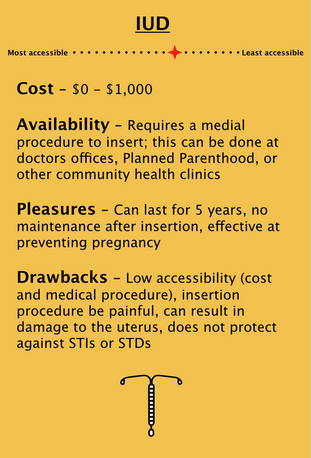Contraceptive Accessibility
- Queer Sex Ed CC

- Dec 11, 2020
- 3 min read
Updated: Apr 21, 2021
This week I worked on a zine examining assessing different methods of contraception through cost, availability, pleasures, and drawbacks.
Contraceptives are essential in preventing unwanted pregnancies and STDs, but the time, money, and research that has gone into creating effective and safe contraceptives does not reflect this necessity. Most contraceptives that we have now were developed decades ago (like condoms, the pill, IUD, etc.) and have had little improvements since. These devices weren’t designed with physical or emotional safety as a priority, and they certainly weren’t designed with pleasure in mind. Despite the many drawbacks, contraception is essential for so many people. Aside from the obvious reasons of wanting to have sex without creating a child, contraception is necessary for preventing the transmission of STDs. I spent some time looking into what kinds of contraceptives are most popular, and how difficult it is to acquire them. Before we get into that, let’s take a look at what’s wrong with contraceptives now?
The burden of preventing pregnancies typically falls onto people with uteruses.
Most contraceptives do little to prevent STDs or STIs.
The large majority of contraceptives aren’t accessible, for financial or medical reasons.
People deserve contraception that fits into their sexual lifestyle. We want contraceptive options that are affordable and accessible, safe and effective, as well as pleasurable and equitable.
I did some googling and digging through my own experience to assemble this small collection of contraceptives rated by accessibility. Let's get into it.
Gloves / dental dams
Cost - $1 - $3
Availability - Stores like CVS or Walgreens, Planned Parenthood or other community health clinics, health centers at some high schools and most colleges, doctors office
Pleasures - barrier method contraception = it protects against STDs or STIs by limiting bodily fluid transference, easy to use effectively
Drawbacks - does not protect against pregnancy
Condoms (external & internal)
Cost - (external) ~$1.00 each, (internal) ~$3.00 each
Availability - Stores like CVS or Walgreens, Planned Parenthood or other community health clinics, health centers at some high schools and most colleges
Pros - Super accessible and widely available, durable (can last 3 - 5 years), no medical appointment necessary to attain, barrier method
Cons - difficult to use effectively; takes some practice
Morning after pill or Plan B
Cost - $50
Availability - Stores like CVS or Walgreens, Planned Parenthood or other community health clinics, health centers at some high schools and most colleges, doctors office
Pros - effective as last minute option, does not require a prescription to buy
Cons - must be taken within 72 hours post sex, must be 18+ to purchase, only effective under a certain weight limit, does not protect against STIs or STDs
The ‘pill’
Cost - 0 - $50 a month
Availability - often a prescription from a doctor is needed, without a doctors appointment, some pharmacies can prescribe birth control, or Planned Parenthood or other community health clinics can prescribe birth control
Pros - most effective for preventing pregnancy,
Cons - low accessibility (needs prescription), lots of maintenance (must be taken at the same hour everyday), can affect mood and body through hormones, does not protect against STIs or STDs
IUD
Cost - 0 - $1,000
Availability - doctors office can insert an IUD, Planned Parenthood or other community health clinics
Pros - can last for 5 years, no maintenance after insertion
Cons - low accessibility (cost + medical procedure), insertion procedure be painful, can result in damage to the uterus, does not protect against STIs or STDs
Implant
Cost - 0 - $1,300
Availability - Doctors offices, Planned parenthood or other community health clinics
Pros - lasts up to 4 years, low maintenance after insertion
Cons - low accessibility (medical procedure), many common side effects include pain and negative mood effects, does not protect against STIs or STDs























Comments